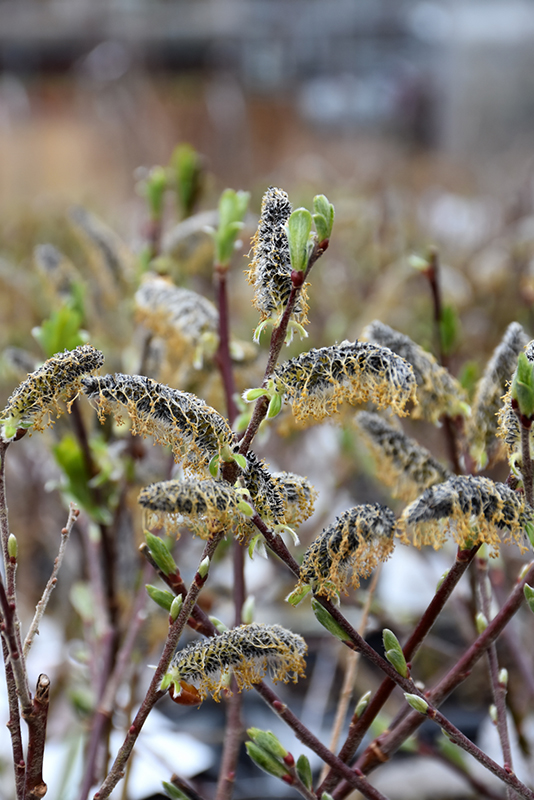Plant Finder
Black Cat® Pussywillow
Salix chaenomeloides 'Lubbers Zwart'

Black Cat® Pussywillow foliage
Black Cat® Pussywillow foliage
(Photo courtesy of NetPS Plant Finder)
Height: 12 feet
Spread: 12 feet
Sunlight:
![]()
![]()
Hardiness Zone: 4
Other Names: Japanese Pussy Willow
Brand: Proven Winners
Description:
This fabulous, unique variety produces hundreds of fuzzy catkins in spring, that start out bright pink and silver, quickly maturing to deep black; a large plant that is very hardy and tolerates wet soil; perfect as a barrier or screen
Ornamental Features
Black Cat® Pussywillow features showy black catkins with silver overtones and gold anthers along the branches from late winter to early spring, which emerge from distinctive pink flower buds before the leaves. The flowers are excellent for cutting. It has dark green deciduous foliage which emerges light green in spring. The fuzzy pointy leaves turn yellow in fall. The smooth bark and burgundy branches are extremely showy and add significant winter interest.
Landscape Attributes
Black Cat® Pussywillow is a multi-stemmed deciduous shrub with a more or less rounded form. Its relatively fine texture sets it apart from other landscape plants with less refined foliage.
This shrub will require occasional maintenance and upkeep, and should only be pruned after flowering to avoid removing any of the current season's flowers. Gardeners should be aware of the following characteristic(s) that may warrant special consideration;
- Messy
Black Cat® Pussywillow is recommended for the following landscape applications;
- Accent
- Mass Planting
- Hedges/Screening
- Naturalizing And Woodland Gardens
Planting & Growing
Black Cat® Pussywillow will grow to be about 12 feet tall at maturity, with a spread of 12 feet. It tends to be a little leggy, with a typical clearance of 1 foot from the ground, and is suitable for planting under power lines. It grows at a medium rate, and under ideal conditions can be expected to live for 40 years or more.
This shrub does best in full sun to partial shade. It is quite adaptable, prefering to grow in average to wet conditions, and will even tolerate some standing water. This plant should not require much in the way of fertilizing once established, although it may appreciate a shot of general-purpose fertilizer from time to time early in the growing season. It is not particular as to soil type or pH. It is highly tolerant of urban pollution and will even thrive in inner city environments. This is a selected variety of a species not originally from North America.
A NetPS Plant Finder tool
